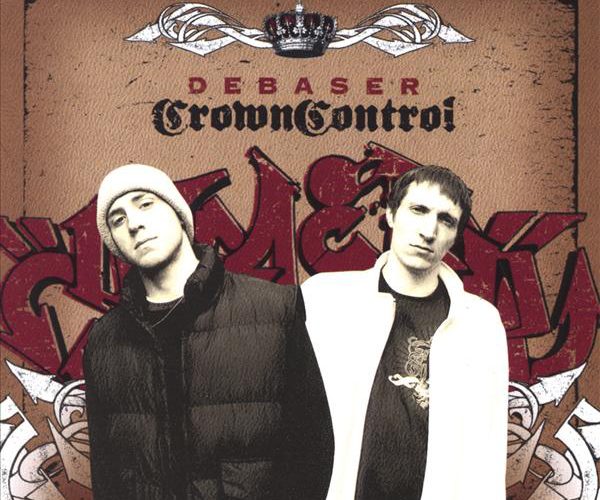The two-man crew has been a standard in Hip-Hop since the Funky Four + 1 disbanded and the Double Trouble got immortalized swapping verses on a stoop in Charlie Ahern’s tome Wild Style. Like the best wrestling tag teams (big up L.O.D.), two MCs in synergy create a force much bigger than the individual components. Case in point—did anyone actually hear (let alone vibe to) the E-double-E and Parrish Smith’s solo joints? A duo can also cover each other’s weaknesses at the same time they play to their collective strengths. Coming in with a 21st century version of the classic pairs of yesteryear, the Oregon-based crew Debaser (of the Sand People crew) have come through with a refreshing, cinematic, complete product with their full-length “Crown Control” (and coming in at over 70 minutes, it truly is full). Driven largely by Sapient’s lush production, ripped apart by both Ethic’s and his verbal gymnastics, the album combines the dusted boom-bap of “authentic” Hip-Hip with an unflinching willingness to push boundaries. It is wholly modern, respecting the foundations but not being confined by them. Aside from all its theoretical importance, however, “Crown Control” is first and foremost a dope product. So despite the disheartening slow melt of Outkast, the Hip-Hop duo is still vital, alive and well.
The boardwork is really what sets “Crowd Control” apart. Haunting and full, with interesting flourishes creeping in and out unassumingly and tempo changes breaking unexpectedly, the sonic blueprint is like a pleasant roller coaster ride full of epic choruses and RJD2-like waves of momentum. Sapient is not afraid to use unconventional instruments and somehow make them feel naturally Hip-Hop (think J-Zone’s accordions), as well as classic manipulations (check the sledgehammer guitar on the posse cut “Stem,” which recalls Rick Rubin’s best work) and modern techniques that sound timeless in the best sense (DJ-friendly scratches abound throughout the album). Most of the tracks employ a variation on a mid-tempo beat with funk hammer reverberations. The end result showcases an increasingly rare product: the art of the full-length in the age of the I-pod, where each song is good, but together they are great. And when’s the last time you listened to a 20-track Hip-Hop album without skipping at least a few tracks? Yes, there is the obligatory rap skit (appropriately but sterilely titled, yep, “Skit”), but thankfully it’s only about a minute and is actually amusing the first few listens.
Lyrically, the two-man crew are both able-tongued and justifiably confident, not trying too hard to impress us with intricate technique or breath control but nonetheless able to take it there if need be, sounding rapid-fire darts without Kweli-like enjambment. It is the mark of seasoned pros with immaculate flows that produces verses like this one found on “Longlive”:
“I’m bordering between genius and pervert
These MCs are pussies hiding under their girl’s skirts
Work ’til these words work to actually further
The state of Hip-Hop ’til I inevitably burn her
Rap ’til my nerves hurt
Smoke herb first
Tap into the zone that acts as a surfer
Cap into the tome
and raps just been murdered
By cash glitter and chrome
I laugh at the nursery talent
Collapse every person we challenge
Consider me a threat from long range like Ray Allen”
In most verses (except a few competent attempts at narratives), the subject revolves loosely around mic skills, but unlike most “underground” rap, they don’t show us what quality Hip-Hop is by complaining about what it shouldn’t be but has become (complaining about mainstream rap is so 2003). On display instead is water-tight technique, plenty of clever turns of phrase and talent oozing out onto the beat. And though their sentiment isn’t exactly breaking new ground conceptually, the craftsmanship and focus of each song makes them fresh and entertaining. Their flows wouldn’t be labeled overly smooth, as the sheer exactitude of each syllable usually sacrifices funkiness for precision, but the beats practically beg to be rapped in, not over or around, so the deliberate articulation works effectively both sonically and thematically (as each word, even syllable, is seen to have been consciously chosen).
And now for the criticisms, however trifling. One: the welcome guests artists (Opio of Souls of Mischief fame and Grayskul especially) have an annoying tendency of stealing the show with verses even hotter than Debaser’s, spitting (appropriately) like they only have 16 bars to kill such lush production. Two: a handful of choruses are delivered with a cutesy off-tune falsetto popularized by 50 Cent and his ilk. Three: the uncomfortable misogyny on “Sugar and Spice,” without a counterweight extolling the virtues of quality females, sounds lopsided and unjust to the fairer sex. Four: the anti-climactic album closer “Thomas” is an interesting but ultimately cliché character study delivered in an Eminem-like singsong, without any flows to save it from total throwaway status. Looking past those problems (and those four are really the only things I can find wrong with this project), one realizes that Debaser is the real deal: a Hip-Hop group embedded in yet also transcending the current standards of the genre, concerned not so much with bringing it back as with moving it along. All hail the crown.

